
5 Common Mistakes to Avoid in Marketing Analytics
Marketing analytics plays a pivotal role in helping businesses make informed decisions. But as valuable as marketing analytics can be, it is essential to avoid certain pitfalls that can undermine its effectiveness. In this blog post, we have covered the five common mistakes you should avoid in marketing analytics to ensure accurate analysis and successful outcomes.
Marketing analytics now has become an indispensable tool for companies aiming to stay ahead of the curve. It involves the systematic examination of marketing data to extract valuable insights and make informed decisions.
Marketing analytics goes beyond simply tracking metrics and delves deep into the patterns, trends, and correlations within the data. By employing statistical techniques and leveraging advanced technologies, marketers can unlock valuable information that guides strategic decision-making.
There are, however, several common mistakes that marketers often make when it comes to marketing analytics. These mistakes hinder the accuracy and effectiveness of data analysis, leading to misguided decisions, wasted resources, and missed opportunities.
Understanding these pitfalls and implementing best practices will enable marketers to extract the full potential from their data and make informed decisions that drive business growth. Let’s dive in.
The Top 5 Mistakes in Marketing Analytics
- Focusing on Vanity Metrics
- Lack of Data Quality and Accuracy
- Failure to Define Goals and KPI
- Not Integrating Data Sources
- Not Regularly Analyzing and Optimizing
Vanity metrics may look impressive on the surface, but they often fail to provide meaningful insights. Metrics like social media followers or website traffic can be misleading without context. Instead, marketers should focus on metrics that align with their goals and contribute to business growth, such as conversion rates, customer lifetime value, or return on ad spend.
Inaccurate or incomplete data can lead to misguided conclusions and ineffective strategies. It’s crucial to ensure data quality by regularly auditing, cleaning, and validating your datasets. Investing in data governance processes and tools can help maintain the integrity of your data and prevent costly errors.
Without clearly defined goals and KPIs, marketing analytics becomes a shot in the dark. Establishing measurable objectives and aligning them with business goals allows for focused analysis and effective decision-making.
Marketing data is scattered across various platforms and channels. Failing to integrate these data sources hampers the ability to gain a comprehensive view of marketing performance. Integrating data from CRM systems, social media platforms, and website analytics tools provides a holistic understanding of customer behavior and campaign effectiveness.
Marketing strategies are not set in stone. Neglecting to regularly analyze and optimize performance leads to missed opportunities for improvement. Continuous monitoring, testing, and refining are essential to adapt to changing market conditions and stay ahead of the competition.
The Impact These Mistakes Have on Marketing Performance
Inefficient Use of Resources
When marketers focus on vanity metrics or fail to optimize campaigns based on accurate data, valuable resources such as time, budget, and manpower can be wasted. Without a clear understanding of which metrics truly drive business outcomes, efforts may be misdirected, leading to inefficient allocation of resources.
Inaccurate Insights on Audience and Campaign Performance
Mistakes in marketing analytics can result in inaccurate insights about the target audience and campaign performance. Without proper analysis and reliable data, marketers risk misinterpreting audience behavior and making decisions based on flawed assumptions. This can lead to misguided targeting, ineffective messaging, and missed opportunities to connect with the right audience segments.
Wasted Opportunities and Missed Revenue
The cumulative impact of these mistakes ultimately translates into wasted opportunities and missed revenue. In today’s competitive landscape, every missed opportunity could be a potential gain for your competitors. By not optimizing marketing strategies based on accurate data and insights, businesses forego the chance to maximize revenue and secure a strong position in the market.
By recognizing the impact these mistakes have on marketing performance, marketers can understand the urgency of addressing them.
How to Avoid These Mistakes in Marketing Analytics
Identify and Focus on the Right Metrics
Align your metrics with business goals and objectives. Identify the key performance indicators that directly impact your desired outcomes. Avoid being swayed by vanity metrics and prioritize those that provide actionable insights.
Ensure Data Quality and Accuracy
Implement robust data governance processes to maintain data integrity. Regularly audit and validate your datasets to minimize errors. Invest in data cleansing tools and technologies to ensure the accuracy and reliability of your data.
Set Clear Goals and KPIs
Establish specific goals that are measurable, relevant, and time-bound (SMART). Define Key Performance Indicators that align with these goals. Ensure that your goals are well-communicated throughout your organization to foster alignment and focus.
Integrate Data Sources for a Comprehensive View
Break down data silos by integrating various data sources. Utilize tools and platforms that allow for seamless data integration. By connecting the dots between different data points, you gain a more holistic view of your marketing performance.
Regularly Analyze and Optimize Marketing Performance
Make data analysis and optimization a continuous process. Set up regular check-ins and reviews to assess performance, identify areas for improvement, and make data-driven adjustments. Embrace a culture of learning and experimentation to stay agile and adaptive.
Tools and Best Practices for Effective Marketing Analytics
Utilizing Data Visualization Tools
Data visualization tools provide an intuitive and visually appealing way to understand complex datasets. They allow marketers to uncover patterns, trends, and correlations quickly. Tools like Tableau, Google Data Studio, or Power BI can help transform raw data into actionable insights.
Implementing Marketing Automation Platforms
Marketing automation platforms streamline data collection, analysis, and reporting processes. They automate repetitive tasks, freeing up time for marketers to focus on strategic analysis and decision-making. Platforms like HubSpot, Marketo, or Pardot can enhance your marketing analytics capabilities.
Establishing a Data Governance Framework
Developing a data governance framework ensures data quality, consistency, and compliance across your organization. It establishes policies, procedures, and roles for data management. Implementing tools like data dictionaries, data catalogs, or master data management systems can support your data governance efforts.
Establishing Regular Check-ins for Data Quality and Accuracy
Schedule regular reviews and audits to maintain data quality and accuracy. Create a system of checks and balances to ensure that your data remains reliable and up-to-date. Assign data stewards or establish a dedicated team responsible for data governance.
Mistakes in Marketing Analytics: Part 2 – Data Quality and Accuracy
Definition of Data Quality and Accuracy
Data quality refers to the extent to which data is accurate, consistent, reliable, and relevant for analysis. Accuracy, on the other hand, pertains to the correctness and precision of the data.
Impact of Incorrect or Incomplete Data on Marketing Analytics
Using incorrect or incomplete data in marketing analytics can lead to misguided insights and decisions. It can result in faulty predictions, ineffective strategies, and wasted resources.
Examples of Mistakes Arising from Data Quality Issues
- Assuming demographic data is accurate when it contains outdated or incorrectly recorded information.
- Relying on incomplete customer feedback data, leading to inaccurate understanding of customer preferences.
- Incorrectly merging data from different sources, resulting in skewed analytics and incorrect conclusions.
Importance of Ensuring Data Quality and Accuracy for Reliable Analytics
Ensuring data quality and accuracy is crucial for reliable marketing analytics. Reliable analytics enable businesses to make informed decisions based on accurate insights, leading to improved campaigns, better targeting, and increased return on investment.
Inadequate tracking and measurement
In marketing analytics, tracking and measurement play a crucial role in understanding the effectiveness of various marketing strategies. Without proper tracking and measurement, businesses can struggle to make data-driven decisions and optimize their marketing efforts. Let’s delve into the importance of adequate tracking and measurement in marketing analytics.
Importance of proper tracking and measurement in marketing analytics
Accurate tracking and measurement allow businesses to gain valuable insights into their marketing campaigns and customer behavior. By implementing the right tracking tools, businesses can:
Identify which marketing channels and campaigns are generating the most leads or sales
Analyze customer journeys and understand touchpoints that lead to conversions
Measure the ROI of different marketing initiatives
Optimize marketing strategies based on data-driven insights
Without proper tracking and measurement, businesses are essentially operating in the dark. They cannot accurately determine which marketing efforts are working and which ones need improvement.
Consequences of failure to set up tracking tools correctly
If businesses fail to properly set up their tracking tools, they can face significant consequences. These include:
- Misallocation of resources
- Inaccurate reporting
- Lack of optimization opportunities:
Without accurate tracking, businesses may invest in ineffective marketing channels, wasting time and money.
Improper tracking can lead to incorrect data reporting, making it difficult to assess marketing performance accurately.
Inadequate tracking makes it challenging to identify optimization opportunities, hindering the ability to refine marketing strategies and improve results.
Types of mistakes that can occur due to using incorrect attribution models
One common mistake in tracking and measurement is using incorrect attribution models. Attribution models help businesses understand which marketing touchpoints contribute to conversions. However, using the wrong attribution model can lead to inaccurate allocation of credit and misleading insights. Common mistakes include:
- Over- or under-assigning credit to specific touchpoints
- Ignoring the influence of multiple touchpoints
- Attributing all credit to the last touchpoint before conversion
These mistakes can result in misguided optimization decisions and an incomplete understanding of the customer journey.
The significance of monitoring relevant metrics for reliable analytics insights
Monitoring relevant metrics is vital for obtaining reliable insights from marketing analytics. By tracking metrics specific to business goals, marketers can:
- Measure the effectiveness of marketing campaigns
- Identify areas for improvement
- Validate hypotheses and make data-driven decisions
- Discover trends and patterns in customer behavior
Without monitoring relevant metrics, businesses may miss important changes and opportunities for growth.
Conclusion
In the fast-paced world of marketing, avoiding common mistakes in marketing analytics is crucial for driving growth and maximizing ROI. By focusing on the right metrics, ensuring data quality, setting clear goals, integrating data sources, and regularly analyzing and optimizing marketing performance, marketing teams can make informed decisions that lead to success. So, embrace the power of marketing analytics and unlock the full potential of your marketing efforts.
Ready to Take Your Marketing Analytics to the Next Level? Let’s Talk!
Turn your marketing data into marketing gold. Get in touch with our marketing scientists and they’d love to play a part in your marketing analytics journey. Just write to us at info@diggrowwth.com and we will get right back to you.
Ready to get started?
Increase your marketing ROI by 30% with custom dashboards & reports that present a clear picture of marketing effectiveness
Start Free Trial
Experience Premium Marketing Analytics At Budget-Friendly Pricing.

Learn how you can accurately measure return on marketing investment.
Additional Resources
Don’t Let AI Break Your Brand: What Every CMO Should Know
AI isn’t just another marketing tool. It’s changing...
Read full post postFrom Demos to Deployment: Why MCP Is the Foundation of Agentic AI
A quiet revolution is unfolding in AI. And...
Read full post postAnswer Engine Optimization (AEO): The New Frontier of SEO in 2025
As digital experiences continue to evolve, so does...
Read full post post Manreet Khara
Manreet Khara 

